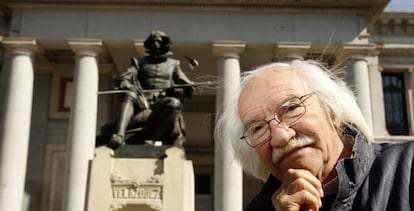"Everything is easy to steal. It depends on who commissions you"
Gentleman thief Erik the Belgian on his life-long love of art and crime

René Alphonse van der Berghe is a retired 72-year-old Belgian expat who lives quietly in Málaga where he spends his days painting until three or four in the morning and getting up late. Nothing particularly unusual about that - except that René is better known as the infamous gentleman thief Erik the Belgian, who arrived in Spain in 1975 fleeing a 300-year prison sentence in his home country.
Over a period of seven years Erik is said to have made the most of lax Spanish security to plunder treasures from hundreds of churches and monasteries across the peninsula, always working under commission from rich, unscrupulous collectors.
However, his new autobiography, Erik el Belga. Por amor al arte (or, Erik the Belgian. For the love of art) - written, he says, in collaboration with his wife of 27 years - gives the impression that he didn't always perform all his great exploits in person. "Better that everyone thinks that," he says. "It's not true, but I find my way of telling it more elegant.
"I've always taken part in the preparation of the robberies I've done here. Not in all the ones they have attributed to me, because they attribute 400 to me and I have done around 30 [...] even though the ones I did were major.
I am a friend of Saint Peter, I have sold a lot of Saint Peter statues and I have saved a lot"
"I am no small-time crook," he insists. "I am a high-class thief. I have stolen for the love of art and I have stolen luxury items. Money has no luxury value."
Does he like to boast about his exploits? "Not in any way. It's better to say that I am proud that they never caught me. If they had, I would have spent my whole life in prison."
The police did in fact catch up with Erik in 1982 in Sitges. After two years in jail without trial and allegedly suffering torture, he is said to have negotiated his freedom by agreeing to arrange the return of thousands of the pieces he had stolen.
So what would happen if they let him loose in the Prado Museum here in Madrid? Could he walk out with a Velázquez under his arm?
"It depends who was waiting for the works that were inside. You cannot steal a work without having a client who is waiting for it. If you do, you go straight to jail. Everything is easy to steal. It depends on who commissions you. They put in alarms, but whoever has placed them shows you how to disconnect them. They're not a problem. The important thing is to have a client."
So what advice can he offer to any budding gentleman thieves out there hoping to rob, say, a sacristy? "You have to give a different piece of advice for each job: how to get out, how to get in, how to go 3,000 kilometers with the merchandise and pass through two countries with it."
Erik has said he would have liked to have "visited" the Vatican Library, but it was "a tricky job," as well as to have stolen the Mona Lisa. What else would he have liked to have taken and why? "I don't know," he says. "Maybe the museum director, if she was pretty."
He did leave some of Spain's cathedrals and monasteries safe and sound.
"The only major cathedral in which I did a job was Tarragona. Monasteries, [I did] quite a lot, beginning with Yuste. There I took the only [Hieronymus] Bosch I stole in my life." It has been 30 years, he says, since his last job.
"Now I don't operate like before, nor do I have much appetite to, either." But if he had his time all over again, would he have been more decent? "I don't think so. It's boring."
Having been married seven times, "love," he says, is what he has most enjoyed. "Love and love of art. Money, too, because a person without money is dead."
Has he confessed all his sins? "I was an altar boy and since then I have never gone to confession. But I am a friend of Saint Peter, I have sold a lot of Saint Peter statues and I have saved a lot. And if when I arrive in paradise, he throws me into the flames, I'll shoot him twice."
Tu suscripción se está usando en otro dispositivo
¿Quieres añadir otro usuario a tu suscripción?
Si continúas leyendo en este dispositivo, no se podrá leer en el otro.
FlechaTu suscripción se está usando en otro dispositivo y solo puedes acceder a EL PAÍS desde un dispositivo a la vez.
Si quieres compartir tu cuenta, cambia tu suscripción a la modalidad Premium, así podrás añadir otro usuario. Cada uno accederá con su propia cuenta de email, lo que os permitirá personalizar vuestra experiencia en EL PAÍS.
¿Tienes una suscripción de empresa? Accede aquí para contratar más cuentas.
En el caso de no saber quién está usando tu cuenta, te recomendamos cambiar tu contraseña aquí.
Si decides continuar compartiendo tu cuenta, este mensaje se mostrará en tu dispositivo y en el de la otra persona que está usando tu cuenta de forma indefinida, afectando a tu experiencia de lectura. Puedes consultar aquí los términos y condiciones de la suscripción digital.








































